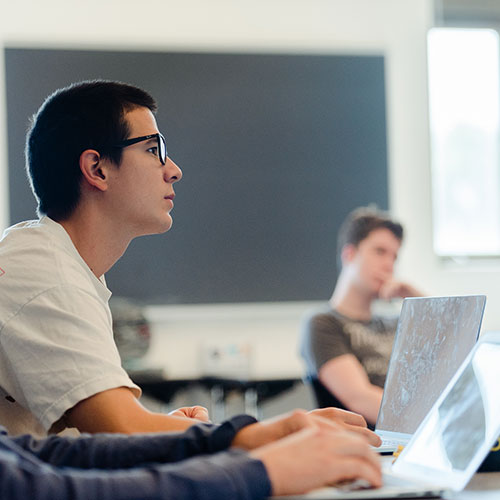By Laurie Laker '12
"Robotics and Computer Vision isn't actually about the machines, it's far more about problem solving," explains CC Associate Professor of Mathematics and Computer Science Matthew Whitehead.
The objective of Whitehead's Summer Session Block B class, Topics in Computer Science: Robotics and Computer Vision, is to encourage student creativity and innovation in a skill-gleaning and problem-solving structure. Students propose a final project on their own, and all exercises in class are hands on with programming and experimentation. In the first week, students are programming a two-wheeled robot to accomplish simple tasks like driving along a wall, finding a way through a maze.
The class is an expanded and updated version of previous classes that he and Professor Emeritus Steven Janke have both taught over a number of years.
"I wanted to elaborate and expand what we'd done before, and a summer class here at CC is an opportunity to incorporate a lot of old ideas into a new, more rigorous block," Whitehead says.
"Making the class a 300-level course gave us the chance to include more AI (artificial intelligence) and machine learning work, which we'd been unable to do previously, and of course with an upper-level course the students are more proficient in the material, so we're open to deeper ideas and more challenging topics."
"Because CC students think big, I try to help the class manage expectations somewhat. The simpler side of the final project should be to take a robot, and the computer vision algorithm, and do something cool!" says Whitehead.
"I suppose one of the unintentional learning objectives from the class would be managing your time expectations - the Block Plan runs at such a pace that not all of the great programming ideas can be done."
Students in class aren't simply programming, they're working with hardware - from assembly to testing. That facility and skill-based learning opportunity makes the class unique - especially for undergraduates. There are collaborative elements of the syllabus, as well, where students work on the programming subsystems together, discuss the ethics of robotics, and the impact that automation has on employment and economic futures.
"For a computer science major like me, this class is extremely interesting. I have never had the chance to work with robots before, to see that aspect of computer science, so it's been really insightful and humbling how the software and hardware have to mesh," says Clifford Chirwa '20, a Computer Science major and rising senior.
"In my first year at CC, I took an Introduction to Computational Thinking class, which gave me the tools of interacting with machines, but also the freedom to create whatever you want - that's been my motivation for continuing in the field."
The class presents CC students with incredible access to skill acquisition opportunities as well as a space to learn from failure.
"To use problem-solving as creativity, with the access we have to so many tools and experience - it's about the way we approach and think through problems rather than how we solve them specifically," Chirwa says.
Summer classes at CC operate on the same pace and rigor of the Block Plan as the regular school year, but summer on campus adds a more close-knit community element to the learning and social environment, explains Tian Lee '20, a computer science major aiming to work in software engineering after graduating.
"Being a rising senior, I know a lot of people on campus and there's definitely a community you associate with while here for summer. The pace outside of class helps you learn more effectively while you're in class," he explains.
"Out of all my classes at CC, the hardware aspect of this course has been the hardest - traversing the maze with different hardware housing all different materials, it required a debugging process that could be pinpointing anything," Lee adds.
From debugging software to demystifying chemistry, Paul Price's '20 interest in the class comes from both a personal and professional focal point.
"It's the direction we're heading in, with robotics and computer vision, and in the way we use that technology - in everything from business to our personal data. There's a basic understanding of how we function, how we deal with a huge amount of data, that's got to be learned through processes like these in class," explains Price, a computer science major.
"Programming can be incredibly frustrating - after the 50th time of unplug and reprogram, for example - but it's great to see that work develop over time, and gaining an understanding of how that process works makes it easier the more often we do it."
Price's professional focal point is a virtual reality startup and 2019 Big Idea finalist called Infinite Chemistry, which he is launching alongside fellow students Prakhar Gautam '20, Pietro Giacomin '20, and Kochi Nakajima '20.
"It's a software and virtual reality platform that changes the way students learn chemistry," Price explains. "It allows people to create videos to demonstrate reactions, the step-by-step process of chemistry."






